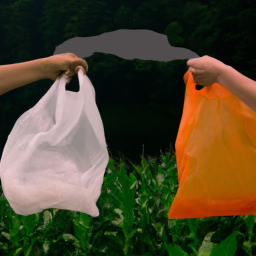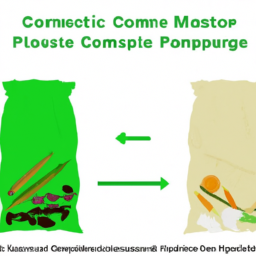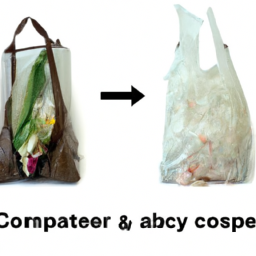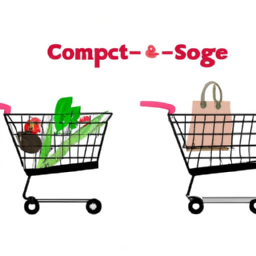Hey there! If you’ve ever stood in the grocery store, torn between compostable and plastic bags, you’re not alone. I’ve been there too. That’s why I’ve put together this comparison guide to help you make an informed decision.
We’ll dive into the environmental impact, material composition, durability, cost, and disposal process of both options.
By the end, you’ll have all the information you need to choose the bag that aligns with your values. Let’s get started!
Environmental Impact

When considering the environmental impact, compostable bags offer a more sustainable alternative to plastic bags. One of the main factors to consider is the carbon footprint. Compostable bags have a significantly lower carbon footprint compared to plastic bags. This is because compostable bags are made from natural materials such as plant starch, vegetable oils, and biodegradable polymers. These materials require less energy and resources to produce, resulting in lower greenhouse gas emissions. Plastic bags, on the other hand, are made from fossil fuels such as petroleum, which not only depletes non-renewable resources but also contributes to the release of greenhouse gases during the manufacturing process.
Another important consideration is the long-term effects of these bags. Plastic bags can take hundreds of years to decompose, if at all. They often end up in landfills or oceans, causing pollution and harm to wildlife. In contrast, compostable bags break down much more quickly and can be composted along with other organic waste. This reduces the amount of waste going to landfills and contributes to the production of nutrient-rich compost that can be used to improve soil health.
Material Composition

Moving on to the material composition, let’s delve into the makeup of compostable and plastic bags. Compostable bags are typically made from plant-based materials, such as cornstarch, potato starch, or other biodegradable polymers. These bags are designed to break down naturally in composting facilities, leaving behind no harmful residues. One of the advantages of compostable bags is that they reduce the reliance on fossil fuels, as they’re made from renewable resources. Additionally, they’ve lower carbon emissions during production compared to traditional plastic bags.
On the other hand, plastic bags are made from petroleum-based materials, such as polyethylene. These bags aren’t biodegradable and can persist in the environment for hundreds of years. However, plastic bags have advantages as well. They’re durable and can carry heavy loads without tearing. Furthermore, plastic bags are water-resistant, making them suitable for storing wet or damp items.
While compostable bags have the advantage of being biodegradable, they also have some drawbacks. They tend to be more expensive to produce and may not be as strong as their plastic counterparts. Additionally, compostable bags require specific conditions, such as high temperatures and moisture, to break down properly. This means they may not decompose efficiently in a landfill.
Durability and Strength

Now let’s delve into the durability and strength of compostable and plastic bags, considering their material compositions.
When it comes to durability, plastic bags have traditionally been seen as the stronger option. They’re made from materials such as polyethylene, which gives them a high level of strength and resistance to tearing. This makes plastic bags suitable for carrying heavier items and enduring rough handling. However, the durability of plastic bags comes at the expense of sustainability. Plastic bags take hundreds of years to decompose, and their production contributes to environmental pollution and the depletion of fossil fuels.
On the other hand, compostable bags are made from plant-based materials like cornstarch or biodegradable polymers. While they may not be as durable as plastic bags, they offer a more sustainable alternative. Compostable bags can break down naturally in composting facilities, reducing their impact on the environment. However, it’s important to note that the durability of compostable bags can vary depending on their specific composition and thickness. Thicker compostable bags can provide more strength and durability for long term usage.
Ultimately, the choice between durability and sustainability is up to the individual consumer. If you prioritize long term durability, plastic bags may be the better option. However, if sustainability and reducing environmental impact are your main concerns, compostable bags offer a more eco-friendly choice, albeit with potentially less long term strength.
Cost Comparison

Continuing the comparison between compostable and plastic bags, let’s now consider the cost aspect.
When it comes to cost analysis, compostable bags may seem more expensive upfront compared to plastic bags. However, it’s important to look at the long-term savings that compostable bags can offer.
Plastic bags are generally cheaper to produce and purchase than compostable bags. This is because plastic is a widely available and inexpensive material. However, plastic bags have a significant environmental impact. They take hundreds of years to decompose, contributing to pollution and litter. This can result in additional costs for waste management and environmental cleanup.
On the other hand, compostable bags are made from renewable resources, such as cornstarch or plant fibers. While they may be slightly more expensive initially, they offer long-term savings in terms of reduced environmental impact. Compostable bags can be easily broken down into organic matter through composting, reducing waste and supporting sustainable practices.
Moreover, some municipalities have implemented regulations or fees on plastic bags to discourage their use and promote more sustainable alternatives. By choosing compostable bags, you can avoid these additional costs.
Considering the cost analysis and long-term savings, compostable bags prove to be a more sustainable and cost-effective choice in the long run.
Disposal and Decomposition Process

To understand the disposal and decomposition process, let me explain how both compostable and plastic bags break down over time.
Compostable Bags:
Disposal Methods:
Compostable bags are designed to be broken down through industrial composting facilities, where they’re exposed to high heat and moisture. These facilities have specific conditions that promote the decomposition of organic waste, including compostable bags.
Compostable bags can also be disposed of in home composting systems, although the decomposition process may take longer due to lower temperatures and slower microbial activity.
Impact on Soil:
When compostable bags decompose, they break down into organic matter, leaving behind no toxic residues. This organic matter enriches the soil by improving its structure and nutrient content, promoting healthy plant growth.
The decomposition process of compostable bags doesn’t contribute to soil pollution or harm soil organisms, ensuring the long-term health and fertility of the soil.
Plastic Bags:
Disposal Methods:
Plastic bags are commonly disposed of in landfill sites, where they can take hundreds of years to decompose. Some plastic bags may also end up as litter, polluting the environment and endangering wildlife.
Impact on Soil:
Plastic bags don’t decompose easily and can remain in the soil for a long time. As they break down, they release harmful chemicals and microplastics, which can contaminate the soil and negatively affect its quality and fertility.
The presence of plastic bags in the soil can hinder the growth of plants and disrupt the natural ecosystem, leading to long-lasting damage to the environment.
Frequently Asked Questions
Are Compostable Bags More Expensive Than Plastic Bags?
Compostable bags tend to be more expensive than plastic bags, but their affordability should be weighed against their positive environmental impact. It’s important to consider the long-term benefits of choosing compostable bags for a sustainable future.
Do Compostable Bags Have Any Negative Effects on the Quality of the Compost They Produce?
Compostable bags may have negative effects on compost quality. The decomposition process of these bags can release toxins and microplastics into the compost, reducing its overall quality and potentially harming plants.
Can Compostable Bags Be Recycled Alongside Other Plastic Bags?
Compostable bags can be recycled alongside other plastic bags. However, the recycling rates for compostable bags are generally lower than those for plastic bags. Additionally, compostable bags have a lower environmental impact compared to plastic bags.
Are Compostable Bags Suitable for All Types of Waste, Including Wet and Liquid Waste?
Yes, compostable bags are suitable for all types of waste, including wet and liquid waste. They are especially great for food waste and garden waste, as they can be composted along with the organic material.
What Are Some Common Misconceptions About Compostable Bags?
Some common misconceptions about compostable bags include the belief that they are not as strong as plastic bags and that they can’t hold wet or liquid waste. However, compostable bags have benefits like reducing plastic waste and helping to create nutrient-rich compost.
Conclusion
In conclusion, when it comes to choosing between compostable and plastic bags, it’s clear that compostable bags have a lower environmental impact. Compostable bags decompose naturally and contribute less to pollution and waste. Additionally, compostable bags are made from renewable resources, making them a more sustainable option.
Although plastic bags may offer durability and strength, it’s important to consider the long-term consequences and choose the more eco-friendly option. Ultimately, making the switch to compostable bags is a small but impactful step towards a greener future.